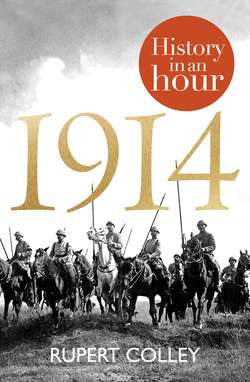Читать книгу 1914: History in an Hour - Rupert Colley - Страница 8
The Road to War
ОглавлениеThe Austro-Hungarians took their time on deciding how best to exploit the situation, conscious of not rushing into overcommitting themselves. Indeed, the cabinet did not meet again until 7 July. First, they sought the support and approval of their ally, Germany. On 5 July, Wilhelm II sanctioned Germany’s support, often since referred to as Germany’s ‘blank cheque’, then promptly disappeared on his annual cruise around the Norwegian coast. Beyond the Balkans, few people took much notice of the assassination in Sarajevo – the killing of dignitaries was not an uncommon occurrence in that part of the world.
It took almost three weeks but finally, on 23 July, the Austro-Hungarian government sent its ultimatum to Serbia. There is no evidence that the Serbian government was complicit in the assassination, and the Serb prime minister, Nikola Paši´c, may indeed have tried to warn the Austro-Hungarian government. The ultimatum, a list of ten demands, was not designed to be accommodating or in any way conciliatory; they were designed to humiliate the Serbian nation or, if refused, to provide the excuse to declare war. In the words of Britain’s foreign secretary, Sir Edward Grey, it was the ‘most formidable document ever sent from one nation to another’.
The Serbian government was given forty-eight hours to respond. In the event, the Serbs accepted eight of the ten demands and suggested the remaining two be decided by international tribune. Within thirty minutes of Serbia’s response, the Austrian ambassador to Belgrade returned home, and the Serbian government ordered the mobilization of its army and moved its headquarters out of the capital to the town of Niš, which, until November 1915 and the defeat of Serbia, became the nation’s wartime capital.
On 27 July, Britain proposed a four-nation conference – with Britain, Germany, France and Italy – to find a solution to the unfolding crisis and the means to prevent its escalation. Germany spurned the offer. But not all was lost – on the same day, the Kaiser, uncharacteristically, declared, ‘We are not at war yet, and if I can, I shall prevent it.’
The following day, 28 July, the Kaiser returned to Berlin from his Norwegian cruise and, on reading Serbia’s reply, was delighted with their positive response, writing: ‘A brilliant solution – and in just 48 hours! This is more than could have been expected. A great moral victory for Vienna; but, with it, every reason for war is removed.’ But it was too late. Although more reasonable than was expected, Serbia’s response was not acceptable to the belligerent Austro-Hungarians. At the same time as the Kaiser was writing his optimistic response, Austria-Hungary declared war on Serbia. (The Serbian chief-of-staff, Radomir Putnik, happened to be in Budapest that day and was detained. Emperor Franz Josef, in an act of chivalry, ordered Putnik’s immediate release and safe passage back home.)
Events now moved quickly as the alliances and promises of the previous three decades and beyond fell into place. On 29 July, the first Austro-Hungarian shells started falling on Belgrade. The Serbian government looked to Russia, the self-appointed protector of all Slavs. The Russian leadership, which felt it had failed to support Serbia during the Balkan Wars, knew it had to offer its backing now or risk losing all influence in the Balkans. Hence, Russia heeded Serbia’s call and on 31 July began to fully mobilize its armies claiming it could not ‘remain indifferent’ to Serbia’s plight.
